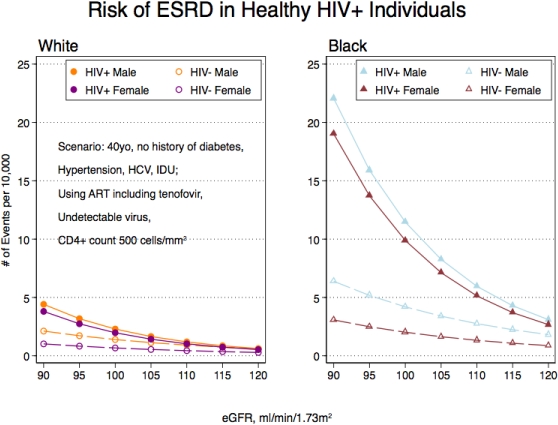Risk of ESRD in Potential HIV+ Live Kidney Donors.
1Johns Hopkins University, Baltimore
2University of Alabama, Birmingham.
Meeting: 2016 American Transplant Congress
Abstract number: 51
Keywords: Donation, Risk factors
Session Information
Session Name: Concurrent Session: Living Kidney Donation: Risk Factors for Adverse Long term Outcome
Session Type: Concurrent Session
Date: Sunday, June 12, 2016
Session Time: 2:30pm-4:00pm
 Presentation Time: 3:06pm-3:18pm
Presentation Time: 3:06pm-3:18pm
Location: Veterans Auditorium
The HOPE Act allows HIV+ individuals to be live kidney donors; however, candidacy for donation is poorly understood given the potential additional risk of ESRD associated with HIV. Our goal was to quantify this risk in otherwise healthy HIV+ potential donors.
Methods: A cohort of 36,364 HIV+ participants of the North American AIDS Cohort Collaboration on Research and Design (NA-ACCORD) and a cohort of 12,460 HIV- participants of the Third National Health and Nutrition Examination Survey (NHANES III) were linked to USRDS to ascertain cases of ESRD. The median follow-up was 5 years (interquartile range [IQR], 3-8) for the HIV+ cohort and 14 years (IQR, 12-15) for the HIV- cohort. We used risk associations from multivariable Cox proportional hazards regression to derive cumulative incidence estimates for selected HIV+ scenarios (no history of diabetes, hypertension, injection drug use, or HCV co-infection) and compared these cumulative incidence estimates with those for similarly selected HIV- scenarios.
Results: For a 40-year white HIV+ individual with eGFR of 90 ml/min, viral load <200 copies/mL, CD4+ count 500 cells/mL, the 9-year cumulative incidence of ESRD was only slightly increased compared with the HIV- counterpart: 4.0 versus 1.1 per 10,000 among white females, 4.5 versus 3.4 per 10,000 among white males. This difference was more pronounced among black individuals, although still the absolute risk was quite low: 19.0 versus 4.2 per 10,000 among black females, and 23.1 versus 6.0 per 10,000 among black males.

Conclusions: HIV+ individuals with no comorbidities and well-controlled disease may be considered low-risk live kidney donor candidates. For each category of race and sex, the additional risk of ESRD due to HIV was quite low; for perspective, this increased risk was comparable to the additional risk of ESRD in HIV- potential donors due to cigarette smoking.
CITATION INFORMATION: Muzaale A, Kucirka L, Massie A, Durand C, Locke J, Lucas G, Segev D. Risk of ESRD in Potential HIV+ Live Kidney Donors. Am J Transplant. 2016;16 (suppl 3).
To cite this abstract in AMA style:
Muzaale A, Kucirka L, Massie A, Durand C, Locke J, Lucas G, Segev D. Risk of ESRD in Potential HIV+ Live Kidney Donors. [abstract]. Am J Transplant. 2016; 16 (suppl 3). https://atcmeetingabstracts.com/abstract/risk-of-esrd-in-potential-hiv-live-kidney-donors/. Accessed July 3, 2025.« Back to 2016 American Transplant Congress
